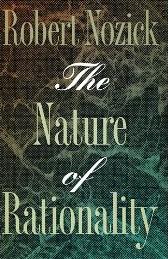 Cover | |
| Author | Robert Nozick |
|---|---|
| Language | English |
| Subject | Practical rationality |
| Published | 1993 |
| Publisher | Princeton University Press |
| Publication place | United States |
| Media type | Print (Hardcover and Paperback) |
| Pages | 226 |
| ISBN | 0-691-02096-5 |
The Nature of Rationality is 1993 book by the philosopher Robert Nozick in which he explores practical rationality. [1] [2] [3] [4]